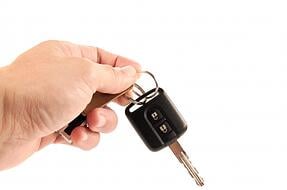Car dealers speak a language all their own, with jargon and shorthand slang that may sound confusing or nonsensical. As a consumer, an understanding of what car dealers are saying to you and among themselves can go a long way toward simplifying and reducing the stress of shopping for your next car.
1) Demo
 One of the easier car dealer terms to understand, “demo” is the industry term used for test drives. Simply put, by embarking on a test drive with you the sales person is demonstrating the reality of the car you are considering. This term goes to show that when car dealers, or sales people in general, are using jargon you don’t grasp it’s probably to save time rather than keep you out of the loop.
One of the easier car dealer terms to understand, “demo” is the industry term used for test drives. Simply put, by embarking on a test drive with you the sales person is demonstrating the reality of the car you are considering. This term goes to show that when car dealers, or sales people in general, are using jargon you don’t grasp it’s probably to save time rather than keep you out of the loop.
2) First Pencil
An important piece of sales terminology to understand, “first pencil” is the initial offer given to customer by the sales manager or salesperson at a dealership. It is naïve to think price offers are nonnegotiable, which is why the first price you are quoted for a car is the “first pencil.” This means it is not written and ink and has room to be negotiated. Be a proactive buyer and if you feel as though the price can come down somewhat, make a counter offer to the “first pencil” offer.
3) Black Vs. Blue Book Value
The average car buyer is familiar enough to “blue book” value, which is generally considered the fair market value of a vehicle. Fewer are aware that there is a separate “black book” value of a car based on what a specific vehicle is likely to bring in at auction. “Blue book” is the fair value, whereas “black book” is usually lower and represents what someone at an auction would pay, in cash, for the same vehicle.
4) Cream Puff
More often than not, gently used cars previously owned by an elderly person are sold instead of gifted as an estate after the owner has died. “Cream puff” is the car dealer term given to those cars, as they are both inexpensive and in great condition. If you don’t mind driving an older model, pay attention to any mention of “cream puff” cars you hear while on a car dealership’s used car lot.
5) Spread and Difference
In car dealer language “spread” and “difference” mean the same thing, the amount of money left over when the value of a trade-in vehicle is deducted from the purchase price of a car. Knowledge of these terms can be helpful while you negotiate the final price of the car to be financed. Be sure to ask if there’s a way the “spread” or “difference” can be lowered, instead of simply negotiating against the sticker price.
A good car dealer isn't trying to pull one over on you by using shorthand jargon among colleagues. Every industry has its own language, and by understanding some of the terminology used by car dealers you can streamline your car buying experience.
*Image courtesy of freedigitalphotos.net




